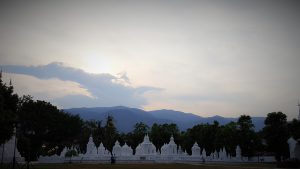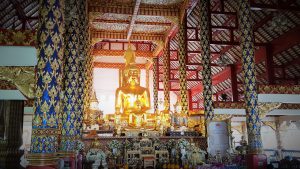By Nina Thao & Verona Deenanth

Buddhism influences Thai people in many ways. We saw that that Buddhism influences the way Thai people live daily with a balanced life and how they treat people and things. We didn’t come to Thailand expecting to gain knowledge opposite of what we were taught in school. Buddhism is supposed to be a religion and a belief that people follow. We learned that Buddhism is a way of life, not a religion.
The founder of Buddhism is Buddha Shakyamuni. He was prince and had a wife and son. At the age of 29, he realized that life was impermanent and full of suffering from desires. He wanted to achieve happiness and mindfulness so he left his wife and son to the forest where he started a spiritual life of meditation. After six years of meditation, he was enlightened in Bodh Gaya, India (Gyatso). The three Buddhist path is “to lead a moral life, to be mindful and aware of thoughts and actions, and to develop wisdom and understanding” (White).
 During the first week of our trip we heard a story that made us both reflect on the good and bad intentions in our everyday lives. Before telling the story, we would like to clarify that we were not present during this time and we are telling the story second handed from what we heard. In one of the vans there was a spider lingering around and one of the students said that they should kill it. I, Nina, would’ve personally killed it or ordered someone else to kill it because the presence of spiders scare me. Our tour guide said to not kill it because it’s not the Buddhist way meaning that it’s not the right thing to do. A student asked a question similar to: Why is killing animals (to eat) not wrong but killing a spider is wrong? Another student stepped in to answer and said that it’s okay to kill animals because humans need meat to eat in order to survive whereas killing the spider would be wrong because it’s not harming anyone and it’s not doing anything for us. Buddhism is all about intentions. Decisions seem to be made by whether the intentions are good or bad.
During the first week of our trip we heard a story that made us both reflect on the good and bad intentions in our everyday lives. Before telling the story, we would like to clarify that we were not present during this time and we are telling the story second handed from what we heard. In one of the vans there was a spider lingering around and one of the students said that they should kill it. I, Nina, would’ve personally killed it or ordered someone else to kill it because the presence of spiders scare me. Our tour guide said to not kill it because it’s not the Buddhist way meaning that it’s not the right thing to do. A student asked a question similar to: Why is killing animals (to eat) not wrong but killing a spider is wrong? Another student stepped in to answer and said that it’s okay to kill animals because humans need meat to eat in order to survive whereas killing the spider would be wrong because it’s not harming anyone and it’s not doing anything for us. Buddhism is all about intentions. Decisions seem to be made by whether the intentions are good or bad.
During the Monk Chat in Chiang Mai, it was very interesting talking to the Monk. A few of the things he said stood out to us. The five precepts stood out especially. They are, respect life, don’t steal and respect others, don’t be sexually promiscuous, don’t lie and don’t do drugs. Because he said these things, we started to wonder about the significant impact Buddhism has on the Thai community. One of the main things he talked about was intentions. One of our guide brought up the topic about cell phones and asked if he thinks it’s okay for Monks to have them. He said that he believed that it was okay for Monks to have cell phones. He believed it was only okay if they had good intentions. Many monks use their cellphones to learn about the modern world, and to keep up this fast changing society that we have. Some Monks use their cellphones to call their families and to keep in contact with them. That’s when we realized that your intentions are they only thing you have control over. You can choose to do good, you can choose to avoid the bad. But it’s all dependent on you. Being in Thailand we noticed, especially in the more rural area people are very kind and welcoming. Before coming to Thailand we were always told to keep track of our things because it might get stolen but based on our experience we saw that in the communities where we were, people had good intentions and they were very good to us.
Another thing we noticed is that though Thailand is an evolving country, communities in the north, in the mountain area, they still have intentions of being one with nature. A lot of the villages depend on farming and agriculture for a base of income. But, even though they depend on it for their income, they don’t take advantage of nature. They work towards using natural products to grow their vegetables. Also, nature is something that helps to bring calmness and mindfulness. From my personal experience I, Verona, am always more calm and peaceful when looking at plants, trees or flowers, anything in nature that’s green. Even in Bangkok, where the city is insanely busy, there are green spaces on the roads and at a lot of corners. We view these green spaces as a way of promoting calmness and mindfulness even in a hectic and busy city.
Overall, although the many view Buddhism as a religion, coming to Thailand we were told that Buddhism isn’t a religion, it’s a way of living, a lifestyle. Through just 3 short weeks in Thailand we have observed that Buddhism truly affects how Thai people love daily. We can also see that Buddhism is a very important part of the lives of Thai people considering the large amount of temples in Thailand, in very convenient locations as well so the locals have easy access to the temples.
June 2, 2016
Works Cited
Gyatso, Geshe Kelsang. “About Buddhism.” About Buddhism. N.p., 2007. Web. 01 June 2016.
White, Brian. “Basic Buddhism.” Basic Buddhism Guide. Buddha Dharma Education Association & BuddhaNet, n.d. Web.

I find Buddhism very fascinating as well. It is definitely another “Thai way of living” that I find authentic to Thai people. The fact that they choose to do things with a purpose makes everything in life more meaningful. I think at first it was hard for me to wrap my head around this, but after all the activities we have done – I really enjoyed seeing different ways Buddhism plays a role in Thailand.
I think it’s interesting how you both focused on certain situations we encountered on this trip that the Thai people evolve their life around the practice of Buddhism. It’s something I also struggle to also understand still while in Thailand and leaving Thailand. I still have a lot of questions on how the Thai people revolve around Buddhism and how they practice it in their daily lives. For example, I had questions on how Monks are able to eat in rural areas where there aren’t daily offerings made, or if the Thai people are looked are looked down upon if they don’t give daily offerings? Thanks for sharing!
Nina and Verona,
I enjoy reading your post and learning about your perspective on Buddhism. The Monk Chat was definetely inspiring, because it was the only chance for us all to learn. I’m glad that KK was able to share his experiences with us during our time there. Coming to Thailand I thought that Buddhism was a religion. It wasn’t until later that it’s not a religion, but a way of life. I still have unanswered questions about Buddhism and the people who practice/believe it. Thanks for sharing!
Hi Nina and Verona,
I enjoy reading this post. It is well written and easy to follow. I do agree with you two that all along I do think that Buddhism is a religion, but as according to what we heard at the Monk Chat Buddhism is a way of life. I also like how you two are able to pick up the meaning of what Buddhism is to the Thai people within three short weeks. You two mention that Buddhism affects Thai daily life and I do see that while on this trip. During this trip while we transitioned from places to places I do noticed that there are a lot of temples. The temples are used for many things including praying, a place to host a funeral., and etc.. Overall you two did a great job. Thank you for sharing with us!